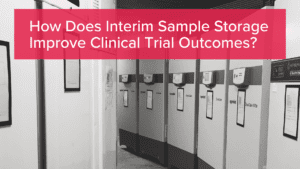May 1, 2023

Quality preservation of samples is key to ensuring reliable results from clinical trial testing. Therefore, when it comes to sample collection, shipping, and storage, decisions should be made with the utmost care and consideration.
Complex projects often involve multiple study sites and require the collection, processing, and testing of large numbers of samples. In such scenarios, it may not be feasible to conduct all the necessary preanalytical sample processing at each individual study site due to limited resources and expertise. To ensure the timely and accurate processing of samples, it is common practice to quickly remove the samples from the study site and to process and store them in a centralized facility for downstream testing. This allows for batch shipments of samples to central or specialty analytical labs, which can analyze many samples simultaneously and with a high degree of precision.
Interim sample storage services provide compliant and standardized preanalytical processing and maintenance of sample integrity and patient data throughout the process. Governance of storage facilities should include current industry best practices to ensure accountability with clinical, ethical, and legal operations.
Advantages of centralized sample storage
Sample storage can help you anticipate and resolve unpredictable complications that arise with clinical sample testing and shipping. Centralizing the operation can ensure consistency in sample processing, thus reducing variability and ultimately improving reproducibility of study results. Centralized storage also allows for quick sample removal, minimizing the risk of sample degradation or contamination, which can otherwise compromise the accuracy and validity of test results.
At CellCarta, storing clinical samples in one location is easy and dependable. Shipment and storage to one lab is less costly and requires less complex kits and instructions for the investigator sites. Prior to test initiation at a variety of downstream labs, samples can be shipped to the central storage locations to clean patient data on requisition forms via the automated Laboratory Information Management System (StarLIMS) query procedure over the CellCarta Customer Portal webserver, as well as to provide clean sample data inventory files per clinical trial at pre-defined intervals.
By keeping samples in our interim storage facility, we ensure their quick delivery to our many global facilities, thus sample test assignments can be rapidly applied. Post testing, remaining samples can return to interim storage facilities, providing convenient access to your inventory for other exploratory testing, if desired.
The need for proper and correct sample traceability
Storage facilities must meticulously track and manage samples. It is important to have independent operators who can ensure sample integrity when receiving, unpacking, labeling, entering, and storing samples.
At CellCarta, our standardized reception procedure consists of distinct qualified operators that adhere to a strict process, whereby samples are entered into StarLIMS, inspected for critical data, and stored. Post reception, all samples (independent of type or condition) follow accessioning and storage. Samples are individually accessioned in LIMS based on project-specific parameters (analytical/work plan): sample tracking including traceability with a full chain of custody. Thus, accurate sample inventory trackers can be provided either ad hoc or at an agreed upon interval with clients.
How should samples be stored?
Storage is dependent on sample type, expected length of storage, biomolecules of interest, and the intended downstream analysis. Samples should be processed and stored under the highest quality standards:
- Active sample monitoring in a variety of temperatures
- Active storage monitoring for temperature and environmental conditions (backup generators, redundant freezers on stand-by)
- Active sample tracking and reconciliation with a LIMS
At CellCarta’s storage facilities we collect, catalogue, and maintain your clinical samples with the utmost care and meticulous quality management systems (QMS). Multisite research networks, clinical sample transport, processing, storage, and ultimately testing, require strict operational workflows and procedures, all of which can be expected at CellCarta. With more than 20 years of expert clinical trial support, adhering to industry best practices, we are proud of our continued performance and dedication to quality.
Contact our team to speak to an expert about your clinical trial needs.
About the author:

Michael Verelst is the Biosample Management & Preanalytics Section Head at CellCarta. He received his master’s degree in bio-engineering and postgraduate in clinical drug research. Based at the Antwerp site, he is responsible for the global management of samples related to histopathological or genomics testing, and interim storage. Michael has held various departmental roles within CellCarta over the past 10 years, building experience in the processing and analysis of clinical samples for various purposes.
You might also be interested by
News
Slope and CellCarta Expand Collaboration with Lab Kit Inventory Portal Agreement
February 3, 2026
More infoCellTalk Blog
This is SPARTA: A Framework for Multiplex Immunofluorescence Analysis
November 13, 2025
More info